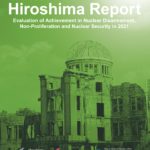(12) Disarmament and Non- Proliferation Education and Cooperation with Civil Society
(12) Disarmament and Non-Proliferation Education andCooperation with Civil Society
Regarding cooperation with civil society in nuclear disarmament and nonproliferation, the involvement of civil society in the process of formulating the TPNW was notable.228
At the 2019 NPT PrepCom, the NPDI presented working papers on disarmament education.229 At the UNGA, the resolution “Youth, disarmament and non-proliferation”— proposed by South Korea with other cosponsors, including Australia, Austria, Belgium, Canada, China, France, Germany, Japan, Kazakhstan, Mexico, the Netherlands, Norway, the Philippines, Poland, Sweden, the UAE, and the United States—was adopted without voting.230 In this resolution, the UN member states were encouraged “to promote the meaningful and inclusive participation of young people in discussions in the field of disarmament and non-proliferation, including through dialogue platforms, mentoring, internships, fellowships, scholarships, model events and youth group activities.” Japan, which has attached importance to such activities, held a discussion meeting with 23 high school students as Youth Communicators for a World without Nuclear Weapons, and with Japanese and other countries’ officials and experts on disarmament issues (including from Australia, Austria, Belgium, Brazil, Canada, Finland, France, Germany, Iran, Kazakhstan, the Netherlands, Pakistan, the Philippines, Poland, Russia, South Africa and Sweden) at the Delegation of Japan to the CD in August 2019. Japan also hosted the “Group of Eminent Persons for Substantive Advancement of Nuclear Disarmament,” and publicized the “Chair’s Report” in October 2019.231
Side events held during the NPT PrepCom and the First Committee of the UNGA, where NGOs can participate, are also important elements of the efforts toward civil society cooperation. During the 2019 NPT PrepCom, Austria, Brazil, Canada, France, Germany, Japan, Kazakhstan, Mexico, the Netherlands, Norway, Poland, Sweden, Switzerland, the United Kingdom, the United States and others hosted such events. And during the 2019 UNGA, Australia, Austria, Brazil, Canada, France, Germany, the Netherlands, New Zealand, Poland, Sweden, Switzerland, the United States and others hosted such events.
Regarding cooperation with civil society, one of the important efforts for governments is to provide more information on nuclear disarmament and non-proliferation matters. Among the countries surveyed in this report, the following set up a section or sections on disarmament and non-proliferation on their official homepages (in English) and posted enlightening information: Australia, Austria, Belgium, Canada, China, France, Germany, Japan, New Zealand, Sweden, Switzerland, the United Kingdom and the United States.
Finally, a few countries started to legislate “divestment” against organizations or companies involved in producing nuclear weapons. According to the International Campaign to Abolish Nuclear Weapons (ICAN) annual report published in June 2019, 325 banks, insurance companies, pension funds and asset managers invested in the top 18 nuclear weapon producers from January 2017 through January 2019.232 Another report by the ICAN stated: “Governments are contracting at least US$ 116 billion…to private companies in France, India, Italy, the Netherlands, United Kingdom, and the United States for production, development and stockpiling of nuclear weapons. State-owned companies in China connected to nuclear weapon production are starting to raise money through bond issuances, while Israeli, Pakistani, North Korean, and Russian nuclear programmes are still not transparent.”233 On the other hand, its other report profiled 77 financial institutions that have in place a policy that restricts investments in nuclear weapon producers.234 Besides this, Switzerland and Luxembourg enacted national laws that restrict financing for nuclear weapons production. Norwegian and Swedish state-owned pension funds do not invest in companies deemed to be involved in developing and producing nuclear weapons.235
228 See the Hiroshima Report 2018.
229 NPT/CONF.2020/PC.III/WP26, April 18, 2019.
230 A/RES/74/64, December 12, 2019.
231 “Chair’s Report of the Group of Eminent Persons for the Substantive Advancement of Nuclear
Disarmament,” October 2019, https://www.mofa.go.jp/mofaj/files/000529774.pdf.
232 ICAN and PAX, Shorting Our Security- Financing the Companies that Make Nuclear Weapons, June 2019.
233 ICAN and PAX, Producing Mass Destruction: Private Companies and the Nuclear Weapons Industry, May 2019.
234 ICAN and PAX, Beyond the Bomb: Global Exclusion of Nuclear Weapon Producers, October 2019.
235 IKV Pax Christi and ICAN, Don’t Bank on the Bomb: A Global Report on the Financing of Nuclear Weapons Producers—2018, March 2018. In Japan, Resona Holdings and Kyushu Financial Group have made similar statements.



-1-150x150.jpg)


